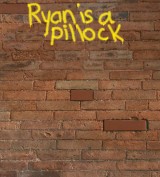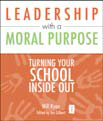Will Ryan suggests how to build a better curriculum by turning your school inside out...
My mother told me that Sheffield and Rotherham could never flood but in the summer of 2008 they did. George Alagiah stood in his waders, knee deep in water, broadcasting to the nation and I went to a flooded school where damaged stock was being unceremoniously dumped into rows of skips. On top of one of them was a small grey book published by the Board of Education in 1937. This aged document referred to all teachers as female, all head teachers as male and provided information about comfortable corsets to wear in the classroom. I then stumbled across a section entitled the Rabbit Keeping Curriculum. For the lovers of furry animals it may not make easy reading.
Rabbit keeping is easily begun and entails a relatively small outlay. There is no need for elaborate accommodation and much of the food will consist of the surplus green stuff of the garden. Of late, rabbit keeping in this country has become more important, partly because of the increased consumption of hutch bred rabbits and partly on account of the demands for pelts and angora wool. School rabbit keeping may therefore be of some influence in suggesting profitable sideline occupations for leisure and home industries for children and parents.
In the classroom, good use may be made of rabbit keeping in connection with the study of biology and hygiene. The work also has undoubted possibilities on the practical side: the pupils, in addition to making hutches for the despatch pelts and carcasses to market, can take part in the dressing of skins, making rabbit fur garments and, if angoras are kept, the hand spinning of wool.
The choice of breed will depend to some extent on personal preference. A visit to a show where rabbits are exhibited is perhaps the best way to become acquainted with the various breeds.
I wonder if Jim Rose had it to hand when he was writing his interim report on the curriculum? It seems to me that the key principles in the Rabbit Keeping Curriculum relate clearly to the six primary areas of learning. It is thematic, relevant, meets all learning styles, incorporates enterprise education, sex education and addresses a range of sensitive and ethical issues
 The year 2009 represents the coming of age of the National Curriculum. I have this vision that teachers will be holding street parties to celebrate its 21st anniversary… I thought that I would organise an informal event where we made pizza toppings and designed our own slippers. It seems a fitting tribute. However, not all are in party mood. Dominic Wyse writes:
The year 2009 represents the coming of age of the National Curriculum. I have this vision that teachers will be holding street parties to celebrate its 21st anniversary… I thought that I would organise an informal event where we made pizza toppings and designed our own slippers. It seems a fitting tribute. However, not all are in party mood. Dominic Wyse writes:
The period since the education reform act of 1988 which first established the National Curriculum has been a bleak time. Heavy prescription through testing, targets and league tables have resulted in an impoverished curriculum.
In many ways the National Curriculum simply built on legislation from the Victorian era and the Revised Code of 1862. Too many schools have failed to meet the needs of successive generations of children.
In many schools the focus is on providing children with chunks of knowledge which could come in handy at some stage, especially if the pupils grow to develop a love of pub quizzes. The real focus should be on equipping children with the essential skills and attitudes they need for life.
I have led many training events which have urged school leaders to demonstrate passionate leadership of the curriculum. It is the head teachers who have claimed this autonomy that now lead outstanding schools.
When I wrote Leadership with a Moral Purpose, I urged school leaders to ask themselves some critical questions. These included:
• Provide a passionate, dynamic and imaginative lead on the curriculum?
• Believe in autonomy in curriculum design rather than follow national frameworks and schemes of work?
• Consider the curriculum to be a source of enquiry rather than the content of knowledge?
• Ensure that long, medium and short term planning provide teachers with a sense of purpose and energy?
The text provides school leaders with strategies to create a vision of the curriculum that truly meets the needs of the children and their community by turning their school inside out. This involves paying less attention to outside influences, such as government policy and OFSTED, as this has the tendency to produce a one-size-fits-all model. Instead schools should turn themselves inside out and build their curriculum from a deep knowledge of the community they serve and the principles that are within the hearts, minds and souls of the school leaders.
Jim Rose’s interim report on the Primary Curriculum is welcome and could transform primary education. The six primary areas of learning are highly appropriate. However, the worst thing you can do is sit back and wait for the final recommendations, thinking that you can then create a curriculum for the next twenty one years. The primary curriculum should always be evolving and changing, so start now.
In 2003, Excellence and Enjoyment urged school leaders to take full ownership of the curriculum. Two years later little had happened and HMCI indicated that too few schools had commenced curriculum reform because of a lack of trust in the government, OFSTED and local authorities. A further three years has brought insufficient change. Possibly more frightening is that some of the key principles of the Rabbit Keeping Curriculum are not embedded.
I wish you success as you grapple with curriculum reform. Start as you mean to carry on by turning your school inside out.
Prepare children for an uncertain future
We need a curriculum that will equip children to grow up in the 21st century. Visitors to the YouTube site, Shift Happens, will know that we need to prepare children for jobs that don’t yet exist. A one-page glance through job adverts in The Guardian shows that we need people with:
• The capacity to motivate others
• High quality communication skills, negotiators and networkers
• The ability to thrive in a fast paced environment
• Confidence within a team
• Flexibility to react to external circumstances
• Ability to think creatively and strategically
• PR skills - someone who can act as media guru, manager, leader and team player all rolled into one
 This was the twelve-inch high graffiti welcome that I got on the first day of my second headship.
This was the twelve-inch high graffiti welcome that I got on the first day of my second headship.
The school was emerging from the most difficult of times. The Victorian building had dry rot infestation, the electrical system had been condemned and the deputy head teacher was serving a prison sentence.
I was unnerved and even a little frightened by the graffiti. It didn’t seem fair to judge the quality of my work before I had commenced the job. However, this only served to strengthen my resolve.
I systematically toured the building, stopping in each classroom, the hall, the library and any other nook or cranny. I imagined it was three years hence and made simple sketches or notes of what it would be like then, and what kind of learning would take place.
Some time later, when OFSTED visited, the school was described as outstanding and, shortly after this, I received an invitation to meet the Prince of Wales. Overall, it was not a bad achievement for a pillock.
 Leadership With a Moral Purpose: Turning Your School Inside Out has received a range of positive reviews from a number of top educationalists including Michael Fullan, Mick Waters, John West Burnham and Professor David Hopkins. It has been described as having the fantastic combination of having its head in the skies and its feet on the ground. It is brim full of passion and stories that bring primary education to life as well providing a range of practical information that will create inspirational teachers who teach inspirational pupils.
Leadership With a Moral Purpose: Turning Your School Inside Out has received a range of positive reviews from a number of top educationalists including Michael Fullan, Mick Waters, John West Burnham and Professor David Hopkins. It has been described as having the fantastic combination of having its head in the skies and its feet on the ground. It is brim full of passion and stories that bring primary education to life as well providing a range of practical information that will create inspirational teachers who teach inspirational pupils.
Leadership with a Moral Purpose: Turning Your School Inside Out By Will Ryan, edited by Ian Gilbert ISBN 9781845900847 Price: £18.99
Will Ryan is the Assistant Head of School Effectiveness with Rotherham Borough Council and a speaker and associate with Independent Thinking Limited.
Easy ways to combat teacher stress
Ace-Heads
